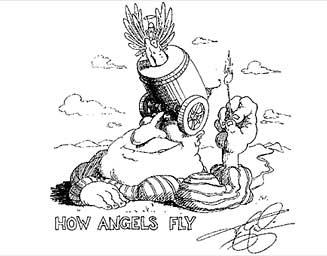
I just read a Time magazine article about the upcoming Terry Gilliam movie, The Brothers Grimm (opening August 29), and the mere mention of his earlier films filled me with a foolish rush of affection. Beyond the apres-Monty Python tang of Time Bandits--but no, that's not fair: even in that Punch-and-Judy show I can feel Gilliam's humane heart, protecting the innocents, turning an indulgent, blind eye on human weakness; but caning like an end-of-his-tether headmaster our tendency toward the self. Gilliam insists we make the first move, and that it be outward to others, as in The Fisher King and Twelve Monkeys. In these films, his best characters lose themselves in the pain of others, even take on their burdens, and are liberated by doing so. But he also knows the price of such abandon and submission, and details the dreams deferred along the way, and the price you pay even to glimpse the promised land. Indeed, in Twelve Monkeys the loss is of simple things--an old song on the radio, the wind in your face, cool sheets--but precious, especially from the dank underground future, where all those things have slid away. Gilliam can break your heart; just watch the faces in The Adventures of Baron Munchausen listening to the Baron's stories. We feel with them the deep need to assert the truth of those tales of wonder and victory; and Terry Gilliam feels that need as well, even though he knows it simply isn't so. But what the hell; he waves his hand--"as much shaman as showman," as Richard Corliss puts it--and grants our wish, and the stars come out, and we climb them like a gentle slope.
Such conjuration, though, can wear you down. Corliss rightfully compares Gilliam to Orson Welles and Erich von Stroheim, "hard-luck masters" whose uncompromising attitudes essentially shut them out of the business. And like those two, Gilliam looks inward, but does not make "personal" films in the indie sense; no, he needs special effects of all kinds, visual, conceptual, symbolic. And that takes money, of course, but in Gilliam's world that doesn't matter; all he wants is room to prestidigitate. I think he never lost the sense of limitless possibility one gets from being a cartoonist and animator. Working for Harvey Kurtzman in the early 1960s in the post-Mad publication, Help! (and here's another sad story of loss: I actually once owned a few issues of that mag), Gilliam worked on photo comic strips (or fumetti, as the Italians put it), where he met John Cleese, leading of course to Monty Python, which lived in a world specifically predicated on the idea of the limitless. Early on, then, Gilliam beautifully, magically erased any possibility of a career that would turn away for even a moment from the deep need for flight and fable. Naturally, the demands of a big business are antithetical to such cosmic doodling--I know, as it must--so Gilliam has had to become Quixote (of course, his great failed project, the movie that would be king) and tilt at Weinsteins, both Bob and Harvey.
Forty years and more down the road from Help!'s mondo weirdo fumetti and the Bronx-cheer footfalls of Monty Python, Gilliam continues to fill me with anticipation. With his movies I am guaranteed an opportunity to see an intricate, dangerously rickety, pinwheeling, gravity-defying reality that tosses everything at me, including its generous heart.
No comments:
Post a Comment